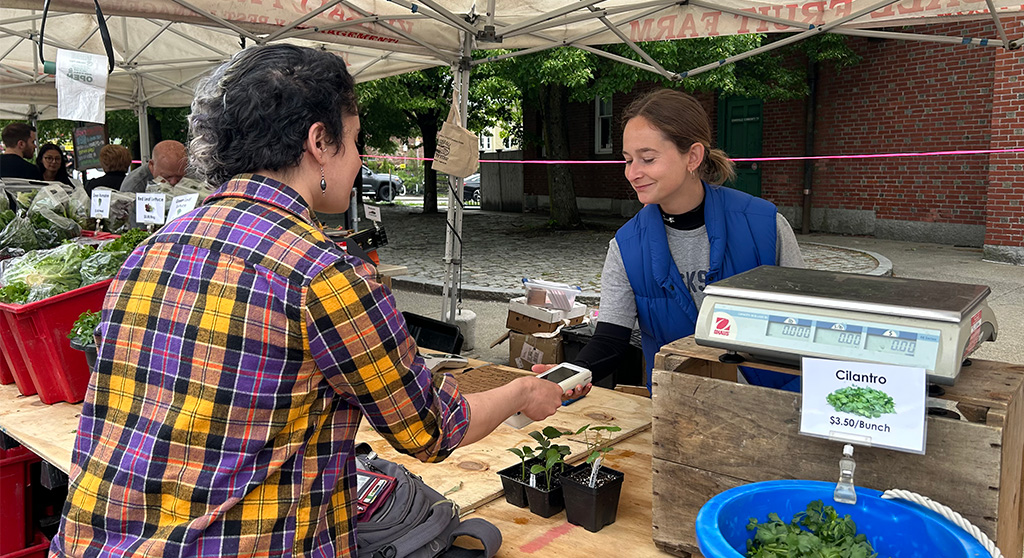Farmers market’s dollar-for-dollar Snap match helps with food insecurity that outlasted Covid

A customer makes a purchase at a Union Square Farmers Market in Somerville. (Photo: Union Square Main Streets)
Did you know that Union Square Main Streets and the Union Square Farmers Market offer a dollar-for-dollar local match for the food program known as Snap for all 25 Saturdays of the market season? This match allows people to double their buying power at the market – through the match, $15 becomes $30.
As a relatively new Union Square business owner and graduate student in nutrition policy and programming at the Tufts Friedman School of Nutrition Science and Policy, I am excited to have taken part in fundraising for a program that has made such a large impact on our broader community. This match is made possible thanks to the City of Somerville, local businesses and neighbors who donate through Good Food For All.
The Supplemental Nutrition Assistance Program formerly known as food stamps, is a federally funded, state-administered program that provides financial support to low-income people for certain food purchases. It directly addresses food insecurity, which per the U.S. Department of Agriculture is the “lack of consistent access to enough food for every person in the house to live an active healthy lifestyle.” Food insecurity is not just the inability to afford food; it is also the lack of access to quality food.
Food insecurity occurs for a variety of reasons, many of which overlap and intersect. They often fall under the broad umbrella of issues of food justice, often intersecting with racial justice and immigration status.
The food market’s Snap match advances a proposition often centered in the food justice landscape: Knowing your food and food quality matters deeply. Programs such as the Snap match increase equity and justice.
This is deeply needed in Somerville and the United States as a whole, which is obvious from looking at some perhaps lesser-known truths: Lack of quality diet is the No. 1 cause of death in the United States, contributing to more than 678,000 deaths annually related to a variety of causes that include heart disease, cardiovascular disease and diabetes. Any program that decreases food insecurity has a demonstrably positive impact on disease, from onset through outcome. At the same time, a 2019 government survey found that 12.3 percent of adults met recommendations for fruit consumption, and only 10 percent of adults met recommendations on vegetable intake of 2 to 3 cups per day.
With survey results like that, it’s no wonder that match programs such as ours – which specifically increase fruit and vegetable buying power – are linked to increased health and wellness and to decreased health care use and spending. These benefits are not just extended to the people who get Snap benefits, but society writ large. The farmers market Snap match focuses around these two important nutrition tenets: increasing food security, and fruit and vegetable consumption.
As the co-founder of a business centered on the experiences of historically marginalized people, I love our beautiful city and think of it as a progressive haven at the forefront of public policy. And still, the amount of people in Somerville experiencing food insecurity has increased substantially since the start of the Covid-19 pandemic, when demand for the Snap match at the food market immediately increased 217 percent. Just in the first month of this market season alone, there has been a 39 percent increase in participation in the Union Square Farmers Market’s match.
Even though from a policy standpoint we live in a post-pandemic world, its impacts are still felt deeply and frequently. Increasing food insecurity is just one of many interrelated outcomes, and I encourage everyone to come to the table and give to Good Food For All. These actions that we take to support our community reverberate, improving the world as a whole. To learn more about how you can help, visit Union Square Main Streets’ website at unionsquaremain.org.
Emily Kaplan
Emily Kaplan is owner of P+E Wellness on Medford Street in Somerville and a Tufts Friedman School of Nutrition Science and Policy master’s candidate for 2024.


